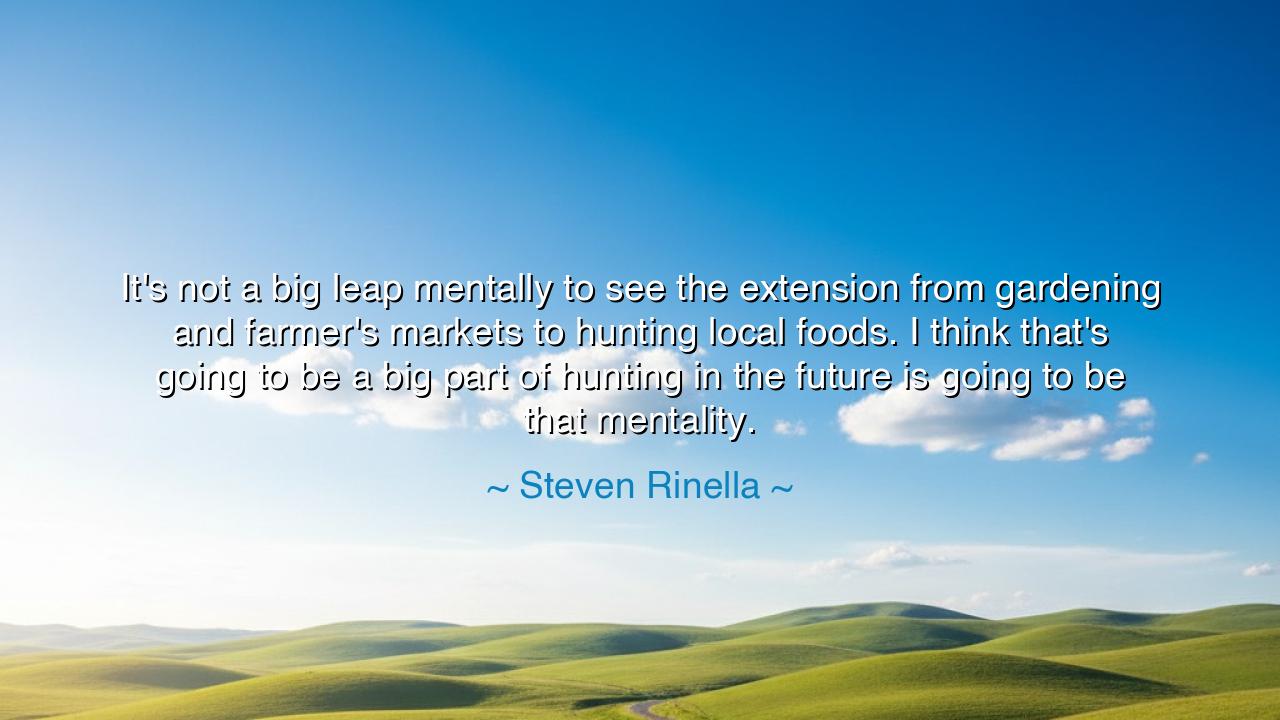
It's not a big leap mentally to see the extension from gardening
It's not a big leap mentally to see the extension from gardening and farmer's markets to hunting local foods. I think that's going to be a big part of hunting in the future is going to be that mentality.






Listen, O children of wisdom, to the words of Steven Rinella, who speaks of the deep connection between humanity and the land: "It's not a big leap mentally to see the extension from gardening and farmer's markets to hunting local foods. I think that's going to be a big part of hunting in the future is going to be that mentality." In these words, Rinella speaks of a return to the roots of human sustenance, where the act of hunting, like gardening and farming, is not merely about acquiring food, but about reconnecting with the earth and honoring the balance between mankind and nature. This idea is not new, but rather a reclamation of an ancient truth, that humanity is at its best when it is in harmony with the land that sustains it.
In the ancient cultures, humans lived in close relationship with the land, the seasonal cycles, and the natural world. The Greeks, in their wisdom, recognized the deep connection between man and nature, believing that gods and spirits dwelled in the earth, the trees, the rivers, and the animals. The early civilizations knew that survival and sustenance came from understanding the rhythms of nature and working with it, rather than against it. Just as agriculture was a sacred act, so too was the hunt, where every creature taken was viewed as a gift from the divine, and every harvest was an opportunity to honor the earth’s generosity.
Rinella's words reflect a return to this ancient wisdom. He suggests that the act of hunting local foods is not a radical departure from gardening or farming but rather an extension of that same mentality—a mentality that understands that our survival is intimately linked to the land and the natural world around us. For too long, humanity has distanced itself from the processes that sustain it, relying on distant suppliers and industrial systems that are detached from the rhythms of nature. But Rinella sees a future where the hunter becomes once again a steward of the land, recognizing that hunting is as much about conservation and respect for nature as it is about food.
Consider the ancient hunter-gatherers, who lived in harmony with their environment. Every hunt was a sacred act, and every gatherer understood the importance of balance—taking only what was needed, ensuring that the land and its creatures would flourish and regenerate. They didn’t take more than they could use, and they didn’t hunt out of greed or waste. Instead, they worked with the land, treating the earth as a living, breathing partner. The act of hunting, in those times, was not seen as something apart from farming or gardening, but as part of the larger system of sustenance, where humans were caretakers, not conquerors.
In more recent history, we see this principle come alive in the work of figures like Aldo Leopold, the great ecologist, who spoke of the land ethic—the idea that humans are part of the community of nature and must act as its stewards. Leopold argued that hunting, when done responsibly, was not a destructive act, but one that maintained balance in nature, preserving ecosystems and ensuring healthy populations of wildlife. Just as gardening requires careful stewardship of the soil, so too does hunting require a deep respect for the land and its creatures. In this light, hunting local foods is an act of conservation, not exploitation.
The lesson, O children of wisdom, is that our relationship with nature is sacred, and it is through this relationship that we find not only sustenance but purpose. Hunting local foods, like farming or gardening, should not be viewed as a solitary act but as a practice of respect and reciprocity with the land. We are not separate from nature but are intricately connected to it, and it is our duty to honor the earth, to protect it, and to live in balance with it. The act of hunting is not about dominance, but about stewardship, about understanding that we are caretakers of the world around us and that our choices must be guided by this understanding.
So, O children of wisdom, let us return to the land, not with a desire to conquer it, but with a spirit of partnership and respect. Whether we hunt, farm, or garden, let us remember that we are part of a larger ecosystem, and that our survival is interdependent with the world around us. Hunting local foods is not a modern trend, but a return to an ancient mentality, one where we work with the land, honoring the creatures and the earth that provide for us. Let this be our guiding principle—to live in harmony with nature, understanding that in doing so, we will find the balance and sustenance that nourish us in both body and spirit.






AAdministratorAdministrator
Welcome, honored guests. Please leave a comment, we will respond soon